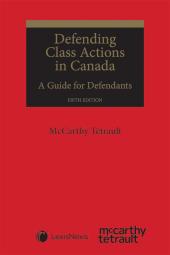The Class Actions Handbook
The basic legal propositions drawn from more than three decades of class proceedings are compiled in this concise and accessible volume geared at lawyers practising in common law jurisdictions.
One Year Subscription Only Terms
Subscribers receive the product(s) listed on the Order Form and any Updates made available during the annual subscription period. Shipping and handling fees are not included in the annual price.
Subscribers are advised of the number of Updates that were made to the particular publication the prior year. The number of Updates may vary due to developments in the law and other publishing issues, but subscribers may use this as a rough estimate of future shipments. Subscribers may call Customer Support at 800-833-9844 for additional information.
Subscribers may cancel this subscription by: calling Customer Support at 800-833-9844; emailing customer.support@lexisnexis.com; or returning the invoice marked 'CANCEL'.
If subscribers cancel within 30 days after the product is ordered or received and return the product at their expense, then they will receive a full credit of the price for the annual subscription.
If subscribers cancel between 31 and 60 days after the invoice date and return the product at their expense, then they will receive a 5/6th credit of the price for the annual subscription. No credit will be given for cancellations more than 60 days after the invoice date. To receive any credit, subscriber must return all product(s) shipped during the year at their expense within the applicable cancellation period listed above.
Product description
"The bookshelves of a Canadian class action practitioner will likely include annotated statutes, loose-leaf binders, textbooks, case books and law reviews. They should now certainly include The Class Actions Handbook as well. Not only is it a recent publication that captures the most relevant class action authority, but it is an authentically multi-jurisdictional work that does not give short shrift to any Canadian jurisdiction, including (most notably) the civilian province of Québec. Equally important, the Handbook is written in clear, concise prose that is accessible to the busy lawyer in need of assistance."
Reviewed by Shaun E. Finn, Author & Lawyer
Partner & Co-Leader of the Class Action Defence Group, BCF LLP
See the review in the BCF Class Actions NetLetter Issue 40 – April 1 (pages 1-9)
It’s been 30 years since the first Canadian common law class action legislation was enacted, and in that time, thousands of class action judgments have been rendered on a broad range of issues. As a result, there is now also a contained set of legal propositions – developed through the courts’ progressive interpretations of the class proceedings statutes – that are regularly applied across a variety of substantive areas of litigation.
In this new text, expert class action litigator, Michael Eizenga, pulls together the main propositions into a handy, practical resource that will prove invaluable to litigators in common law jurisdictions.
Indispensable Guidance
The Class Actions Handbook provides useful insight into the class action regime that has developed in Canada. In particular, Eizenga provides:
- An overview of the statutes and rules governing common law class actions across the country including key places where they differ
- A summary of the stages of class actions from commencement to conclusion
- Substantial discussions of the key topics in class actions, including: certification, settlement, multijurisdictional issues, notice concerns, limitation periods and fees and costs
- High-level information about how aspects of the class action regime operates in Quebec, which is important for common law practitioners to know, given the multijurisdictional nature of many class actions
- Appendices which include sample class definitions and common issues, key cases and an outline of recent amendments to the Ontario statutes
This comprehensive and quick guide on class actions will be indispensable to Canadian litigators. Practitioners who work in-house or for government will also benefit from this volume. Finally, The Class Actions Handbook will be an excellent educational resource for law schools.
Table of contents
Chapter 1 – Introduction
Chapter 2 – The Stages of a Class Action
Chapter 3 – Carriage and Multijurisdictional Issues
Chapter 4 – Limitation Periods
Chapter 5 – Notice
Chapter 6 – Conclusion of the Class Action
Chapter 7 – Fees
Chapter 8 – Costs
Appendix A – Sample Class Definitions and Common Issues
Appendix B – Amendments to Class Proceeding Act, 1992
 Lexis Nexis
Lexis Nexis 



